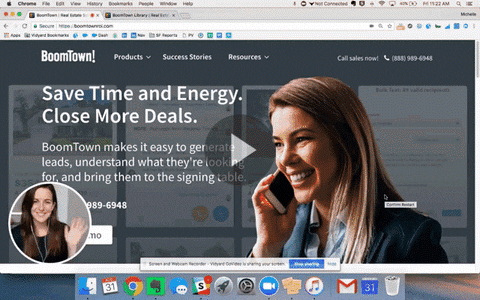You are viewing our site as an Agent, Switch Your View:
Agent | Broker Reset Filters to Default Back to ListHow to Follow-Up with Leads 450% More Effectively
February 25 2019
 Do you ever feel like your follow-up process is letting leads slip through the cracks? You've spent money generating leads. You've watched them register on your website. And then... no response. No engagement.
Do you ever feel like your follow-up process is letting leads slip through the cracks? You've spent money generating leads. You've watched them register on your website. And then... no response. No engagement.
It's frustrating to see active homebuyers leave you high and dry. Done enough times, you get fed up, right? Now, before you call it quits, let me walk you through a few "investigative" ways to improve your lead follow-up.
1. First Contact: What to Say
The traditional model for lead follow-up is to qualify for LPMAMA: location, price, motivation, approval for a loan, mortgage amount, and agent they're working with. Most agents will introduce themselves and tee off the conversation with this structure.
So, how do you stand out to the lead?
Add a data point to your script. When a new lead registers on your website, they have probably been looking at several properties beforehand. Use that data to your advantage. It should be found in your real estate CRM. If your CRM and website aren't connected, I'd suggest getting them integrated immediately.
An example runs like this. You see "Jack Catterton" has registered on your website after viewing a home in the Sweetgrass neighborhood at a price point of $300,000. It's a modern-style home with four bedrooms. Now, the conversation can start something like this:
Hi Jack! My name's Matthew and I work for Cobblestone Realty. I saw you registered on my website an hour ago. It looks like you were looking at homes in Sweetgrass. Those are really beautiful homes! Now, are you set on moving to that area or are you specifically looking for homes that match that style?
See how your communication instantly portrays you as an expert – as someone who can help? You're not blindly trying to grab information from the person anymore. Instead, you're building on their home search and offering help. There's a psychological difference between trying to gather info to sell someone versus trying to help someone.
2. Call vs. Text vs. Email
It's easy to piggyback to calling leads – it's been the go-to method for decades. But with smartphones becoming the new standard and with the rise of a younger generation, oftentimes, texting is a better method for communicating with leads.
Does this make it true for you? Maybe. You'll need to test this out.
Spend a week analyzing your lead responses between email, text messaging, and calling. I think you'll find text messaging to be the better form of communication.
If you're worried about the manual work going into texting every lead, check if your real estate CRM has an automation, where you can bulk- or auto-text leads. Agents who used BoomTown's Drip Text feature saw a 450 percent engagement rate from leads.
If you want to spice up your lead communication, try sending a video email. People love putting faces to names. And it makes a standout introduction that no other agent does. See if it makes a dent in your lead follow-up. Here's an example below:

3. Frequency: When and How Often to Contact
We've all heard about the study telling us it's best to contact leads within the first five minutes of registering. Obviously, it's not that simple. There will be times when you're out showing houses or meeting with clients, and those take priority.
A lot of real estate agents will block off specific times in their day to do lead follow-up. And I'll tell you from BoomTown's data, nearly every agent does this in the morning (specifically around 10 am). And I'll also tell you it's a time where you'll see the least amount of responses from leads.
So, when is a good time to contact leads? Typically, it'll be the evening. Of course, every market is different, and will experience varying results. If you're calling or texting, aim to do it in the evening. If you're emailing, save it for the afternoon (while people are still at work and checking their inboxes).
Now, for how often you should reach out. A lot of real estate businesses have some version of the "10 days of pain," where they'll alternate emailing, texting, and calling for ten days straight. Personally, that sounds extremely annoying. For some agents, it works. My recommendation is change up the content a bit. Use the data at your disposal and offer a reason for someone to respond. Don't just hound them for personal info.
Typically, it'll take 5-12 attempts to contact a lead before you get a response (or a commitment). Does this mean it all has to happen in the first two weeks? No. Space it out. Some homebuyers may be just window-shopping at the moment, so make sure to reach back out in a month if they don't respond.
4. Segment and Sort Your Leads by Category
No lead is equal to the next. Some will be ready to see houses now, others are "just looking." A batch of leads may generate from Zillow or Realtor.com, while others will generate from Facebook advertising. Or they could be referrals.
Depending on the type of lead and where they are converting, this information will tell you how to treat them. A referral or Zillow lead will obviously be further down the sales funnel, and more "ready." A lead from Facebook may take longer to nurture, since you're trying to create demand on a channel that's not real estate specific.
Second, determine the lead's timeframe—for buying or selling. If they're a year out, automate their communication with market updates and touch base every few months. If they're actively looking to buy/sell, then be more aggressive with your outreach.
Overtime, you should build out specific follow-up plans for your lead categories. A classic example is to create a category of leads who registered six months ago, but who have visited the website last week. Send them an email, and capture a few responses. You'll be surprised at the results.
5. How to Handle Lead Objections
Dealing with leads who have a myriad reasons of why they're not ready is challenging. From my experience, I have two suggestions to better handle lead objections: 1) Actively listen to their remarks, and 2) Ask questions.
Don't sell yourself. Don't be pushy or give up entirely. Listen to their reason for not wanting to act, and then ask questions about it. For example, you'll often hear, "I'm a few years out from buying."
From there, you can respond with: "Just out of curiosity, what is the significance of that date? If we could get you approved for a loan, get you in a house today and show you how to save thousands, would that be of interest to you?"
Remember, you're not trying to "win" the lead. You're trying to solve their fears. Buying (or selling) a house is a HUGE deal, financially and emotionally. Give them the time and space needed for such a transaction.
- We have objection handling scripts! Get the free scripts here.
6. Wrapping Up Lead Follow-Up
My last bit of advice for effective lead follow-up is... leave notes. Whether that's in your CRM or in a spreadsheet you have. The homebuying process can take months, and leads take their time to become serious clients. Remembering their needs and how you've previously communicated with them becomes difficult when you have hundreds of leads in your database.
Leave notes in their profile so you know where to pick up the conversation. And so you don't sound like a buffoon if they happen to reach out to you.
To view the original article, visit the BoomTown blog.









